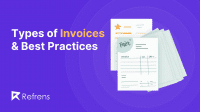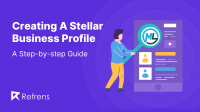If you’ve already conquered the freelance world, you may now be ready to expand into the next logical step: starting an agency.
First and foremost, solo freelancing and running a full-fledged agency are two very different things. The set of skills required for both vary drastically as well. While solo freelancers can take on smaller projects; an agency often has a team, so they can take on more projects – also for their survival. They can also target big-ticket projects as those clients often prefer a team than an individual.
The approach you choose does not change the fact that you will be dealing with clients and managing all the other nuts and bolts required to get a client’s project up and running well.
Being an agency owner means taking responsibility for the growth of others. Everyone you employ will be impacted by the choices you make.
Therefore, before you jump the gun and start an agency, make sure you’ve aligned yourself with these 7 steps.
Watch this video to know more about these detrimental steps.
1. Learn To Manage People
Learning how to manage people is the very first thing you need to excel at while building an agency.
It doesn’t matter how good you are at your work. You won’t get far if you can’t connect with other people and inspire them to work with you. Gone are the days of working solo, now it’s time to be a team player.
Now the easiest way of creating a team is to hire an intern. This intern will teach you how to become a manager. How to change that freelance mindset to an agency mindset. You can offload some of your ad-hocs to this person. The same virtue will help you learn how to delegate/teach something to a teammate.
Another important thing to keep in mind is instead of waiting for this intern to reach out to you with questions, updates and concerns, take initiative when communicating with the person. This will help you polish that accountability skill.
These are crucial skills for an agency owner to step up their professional communication.
Now once your intern’s transition has been completed, it’s now time to employ your first employee. Ideally, you should hire someone who is skilled at your freelance skill. This will help you to set a constructive feedback loop.
By doing this, a freelancer can assist their team members in discovering their strengths and pinpointing their areas for development. Moreover, a freelancer should create a calendar in SharePoint to schedule team meetings and give valuable tips to their team members.
Also, subcontracting some of your work to other newbie freelancers is a wonderful start. It’s a win-win because you get the lay of the land.
Check out the freelancer management tool to supercharge your business.
2. Define The Macro/Micro Goals
If you don’t do your homework before establishing your agency goals, you may wind up failing and drowning yourself in unintended work. That is why it is critical to learn how to create these goals precisely.
First and foremost, identify your expertise.
Goals are based on your priorities, so develop a list of the topics your agency wants to bring under the umbrella before creating your five-year plan. You will be tempted to include everything in your strategy, but that is completely unrealistic. Make a concise and realistic list of your key points.
Your main key points should address both your work life and the careers of your teammates.
Another way to come up with effective goals is to create SMART goals.
Your objectives should be specific, measurable, achievable, realistic, and time-bound, according to this strategy (SMART).
You can simply manage your SMART goals by breaking them down into monthly and weekly targets. This way you can concentrate on short-term and long-term goals simultaneously.
So, as you assemble your team, divide up the tasks among the members. Finding the right job for each person on a weekly and monthly basis requires more than just their technical abilities or experience; it also requires their ability to drive the task at hand and develop the team’s reputation.
Additionally, you can also specify which team members will be given responsibility for particular tasks, such as making decisions, helping with administration, or handling finances.
Recommended Reads: 15 Best Invoicing Software In 2024
3. Sort The Legal & Tax Issues
You must determine how to handle your agency’s taxes and liabilities. If you form an LLC, you will have legal protection if someone sues you. Having an LLC will also give your company more credibility with customers and with the law. It also opens up a number of tax advantages for you. Also, to keep your LLC in compliance and in good standing, there is an ongoing LLC yearly fee to be paid in your state.
You can also use a professional to take care of your taxes. If you are familiar with taxes and can manage them on your own, keeping a professional record of your taxes will make things much easier for you.
Make sure you have a lawyer that manages all legal matters for your business, including the preparation of contract agreements.
Check out the 5 tax tips for freelancers.
4. Start Small & Double Down
Apple and Amazon did not become industry giants overnight. They began with an idea and gradually grew to become household names.
Consider small steps before jumping into a full-blown agency despite your dreams of becoming a Fortune 500 company.
You can start by hiring a virtual assistant to help you with non-client tasks like things on your to-do list or you can subcontract out little assignments. By doing this, you’ll avoid the tension that comes from juggling too many tasks at once.
You can carry on doing this until you feel fully prepared to enter.
Starting small will give you the confidence you need to handle any challenges that may arise. However, if you neglect this step, you will learn on the job, which could be bad for your brand.
Also Read: Is Freelancing The Future Of Employment?
5. Have SOPs In Place
Transitioning from a freelancer to an agency requires a change in the process. As a freelancer, you could have an unwritten routine that you follow with each project, but most of the time, people who work for themselves act out of habit and not intent.
As a freelancer, you might have gotten away with it, but as an agency, it won’t fly. You must firmly establish your working style, you must set down some sops for client onboarding, client communication, project management, delivery management, etc.
Writing standard operating procedures (SOPs) could be the technique your agency requires.
However, most agencies avoid drafting them entirely. Since agencies are known for quickly onboarding new freelancers and establishing new procedures, it makes sense that SOPs are routinely ignored.
Having an SOP template in place will help your agency succeed.
Furthermore, they provide detailed descriptions of how a particular process is performed by employees of the firm.
Having SOPs in place assists agencies in avoiding burnout. SOPs can be a resource rather than a hassle if they have clear standards and rules, consolidated information, and frequent updates.
Setting up your SOPs clearly will boost productivity, and accelerate and streamline operations for you and your employees.
Recommended Reads: Top Invoicing Software For Consultants
6. Leverage Skill Multiplication
As your agency grows, strive to build an ecosystem around the key expertise that you provide. Don’t merely recruit people with skills that are unrelated to your main offering at random. Find the next thing that will help your gig succeed. Using the best hiring tools for talent is essential in this process.
For example, if your major business is to create websites, you’ll need a graphic designer to help you design them. Then there’s the content writer who can assist you with the write-up and developer. This way you can create a whole layout of what would be required from you to your client.
This would also help you save a lot of clients. Because, if you have everything ready to go for your clients, they will not go to another agency. Furthermore, you now have everything in-house, and you will save money on hiring a freelancer for that specific job.
Recommended Reads: Top 7 Invoice Generator Software
7. Determine The Skill To Scale
As a freelancer, you have one or two skills that you excel at. With these talents, the services you provide to clients usually produce additional resources for you. If you haven’t taken the effort to identify these abilities or services, you can easily discover them by reviewing your past project list and the amount you were paid per gig.
Your profitable services are the three most common gigs you conducted that earned you more money.
So, selling superfluous or undesirable skills could be detrimental to your company’s performance in the long run. When establishing an agency, you should concentrate on the skills and services that you know your target audience is interested in. This will allow you to effortlessly obtain clients and accelerate your growth.
Check out the most in-demand freelance skills.
You can also consider combining SOPs we’ve written about before, with service productization. Such services are easier to sell, and scale, as your newly hired team follows a script on how to deliver such a service, rather than doing custom work all the time. To further increase efficiency and consistency, consider incorporating an AI script generator into your service delivery process. This tool can automate the creation of personalized scripts based on client needs and specific service parameters, ensuring your team always delivers top-notch service while you focus on the bigger picture.
Is Your New Agency Ready To Take Off?
Starting an agency can be a rewarding and challenging endeavor.
There’s no doubt that starting an digital PR agency takes preparation. However, once you’ve laid the groundwork, you can start building your business by identifying projects and learning some of the processes you can follow to ensure your agency runs smoothly.
Good luck!
Get freelancers for your agency now with Refrens!
Recommended Reads: Top 8 e-Way Bill Software
Read more: Top 10 Billing Software For Chartered Accountants
Recommended Reads: E-invoicing In GST: A Complete Guide
Recommended Reads: Billing Software For Export Business



















